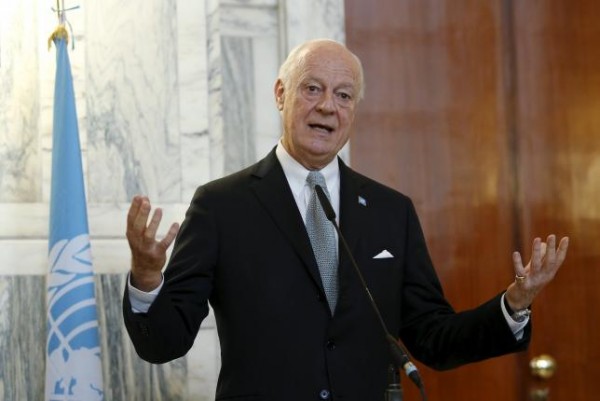
By: Raghida Dereham Columnist and Senior Diplomatic Correspondent, Al Hayat
If the goal of the letter sent by the Syrian opposition Higher Negotiation Council (HNC) to the UN Secretary General and his special envoy 48 hours before the Geneva talks were set to convene on Friday was to specify demands and stances clearly, then that move would be prudent in the context of negotiation strategy and even art. But if Dr. Riyad Hijab is serious that the HNC has preconditions — such as the full implementation of the Geneva Communique, resolution 2254, ending sieges, delivering aid, stopping attacks on civilians, and releasing detainees before holding talks — then he would be absconding from the Geneva talks on behalf of the HNC or committing a tactical mistake in his negotiation strategy.
Indeed, no matter how justified the demands of the opposition are, politically and militarily, it must not act without taking stock of the facts. We are not in 2012, when the Geneva communique was passed before being shelved at the Security Council by both the US and Russia. That communique called for the formation of a transitional governing body with full executive powers mutually agreed between regime and opposition representatives. In reality, however, the US, Russia, and the UN have for all intents and purposes replaced the communique with the Vienna process under different reference frames.
Vienna is essentially a Russian-owned process concocted in parallel with the Russian military intervention in Syria’s war. This has changed equations at multiple levels, with Russian air strikes going hand in hand with Russian diplomatic strikes.
We are in the era of US capitulation to the Islamic Republic of Iran and complacency towards its militias fighting alongside the Assad regime, all while the Obama administration claims it wants to see Assad step down.

At this phase of the Syrian tragedy, what is needed is a logical and honest review of who made promises and reneged on them, who escalated then backtracked, and who remained persistent in their loyalty to Assad for strategic calculations and self-interest such as Russia, Iran, and Hezbollah — and who splintered in the opposition and engaged in internal rivalries. We are in a place where we have to choose between further Russian strikes on Syrian rebels in support of Iranian-assisted regime gains on the ground; and heading to Geneva with a seasoned opposition delegation that can compel Russia and the regime in Damascus to implement ceasefire and that can impose itself in any political deal.
Many will say this is a call for surrender as the UN backs away from the Geneva Communique in favor of a loose reference framework in the Vienna process. Loose because of the radical differences between the 20 powers involved in the process, including Saudi Arabia and Iran, particularly over the fate of Bashar al-Assad: will he remain in power to run in the elections after 18 months of the political process or will he step down under a Russian-US-Iranian agreement before?
It might be said that it would be moral bankruptcy for the Syrian opposition to be placed before the choice of either surrendering to US- and UN-sanctioned Russian/Iranian demands, or being blamed for not only foiling the Vienna process, but also intensifying the Russian bombardment and the brutal barbaric campaign of the regime forces and allied militias.
The opposition might object against the fact that there is not even a hint of the Geneva Communique in the propositions and no declaration of its death upon the birth of the Vienna process. More importantly, the opposition might object against the US and international complacency towards war crimes and ethnic cleansing, demographic engineering plans being apparently part of the negotiations in the Vienna process.
All this is true. But the question is, what should otherwise be done? If the Syrian opposition comes to believe that more compromises before one fait accompli after the other will squander all reasonable settlements without any return, then it is best to develop a strategy to set priorities and alternative plans in the event the players in Syria reject these priorities.
This requires two things: A clarity of the positions of the multiple opposition forces and how much these can be brought together to agree on priorities and demands. And second, clarity in the political and military margin of support of the countries backing the opposition. To be sure, the ambiguity and ambivalence in this respect fuels polarization and meddling, which both harm the Syrian opposition and its reputation.
The Syrian opposition might decide that the tragedy and humanitarian disaster in Syria force it to consider choices such as consenting to incomplete deals in the Vienna process and going to the Geneva talks, as the UN envoy de Mistura desires, to launch negotiations and reach a ceasefire during the talks.
In other words, the Syrian opposition may decide that the best option is not to give Assad or Putin the gift of boycotting the talks and avoid being blamed for foiling the political transition in Syria, and the continuation of Russian-Syrian bombardment without agreeing to a ceasefire.
If the Syrian opposition HNC decides to head to Geneva, the first thing it has to admit to itself is that this is not Geneva-3. It is Vienna I.
The Syrian opposition has the ability and the right to take any demand it deems reasonable to the talks, as long as it is realistic politically and represents a solid reference point. Most certainly, the Syrian opposition must adopt a conscious humanitarian strategy to ensure the appalling international neglect of Syrian lives does not continue. However, the first steps must focus on unification and skillful negotiation, then on clarity in the positions of allies instead of polarization and meddling, and third, on developing a clear vision and a realistic roadmap.
Political realism requires understanding that the new decisive factor in Syria is the direct Russian role in the battles in support of the regime at any cost.
Some believe Syria will be Russia’s new Afghanistan and that its victories will soon evaporate. This is possible, but the reality on the ground does not indicate the armed opposition or ISIS could turn the tide in the US-sanctioned and Iranian-Russian supported war alongside the regime in Syria under the pretext of fighting terrorism.
Political realism indicates that the US is pursuing a neutral policy in Syria during the presidential elections, and this too is a crucial decisive factor.
What senior officials at the UN concerned with this issue are saying is that Staffan De Mistura and his team are wagering on Russia’s need to withdraw from Syria before it becomes entangled in a quagmire. The international envoy and his team thus believe that the window is now open to Russian concessions in the framework of the Vienna process, and for creative discussions if the opposition delegation proves it is politically seasoned.
Positive change is possible on the ground in light of the talks and negotiations, otherwise the negative change would be the intensification of the bombing campaign because the Russian-led camp would be more free to do so if the political track in Geneva fails.
The options available to the Syrian opposition are not easy, especially in light of its divisions and the false promises of some of its backers. No one is innocent of what has happened in Syria, in varying degrees of course, including the opposition itself.
The situation in Syria is not one of victor versus defeated. No one is winning in Syria whether the regime, ISIS, Nusra Front, Russia, Iran or Iranian-backed militias. Certainly, nor is the Syrian opposition.
It is naïve to say that Assad’s survival is a victory for having brought Russia and Iran on his side, with international consent at least for 18 months in accordance to the Vienna process timeframe. But there can be no victory for someone who turned his country into a magnet for terrorism and militias, and who has given an open invitation to foreign military intervention just to survive in power.
The Huffington Post
Translated from Arabic by Karim Traboulsi
Originally published in Al Hayat
http://www.alhayat.com/Opinion/Raghida-

Leave a Reply
You must be logged in to post a comment.